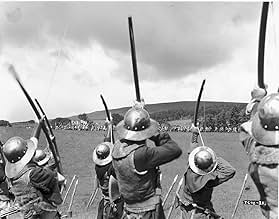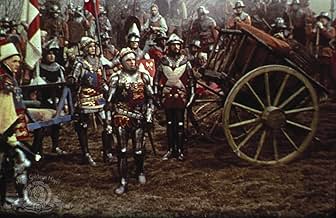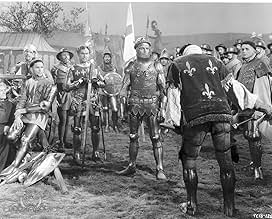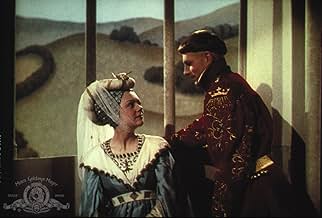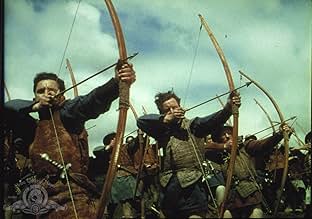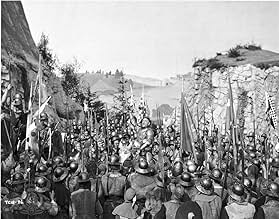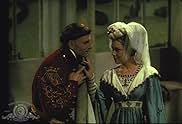Enrique V
Título original: The Chronicle History of King Henry the Fifth with His Battell Fought at Agincourt in France
PUNTUACIÓN EN IMDb
7,0/10
7,4 mil
TU PUNTUACIÓN
En plena Guerra de los Cien Años, el joven rey Enrique V de Inglaterra se embarca en la conquista de Francia en 1415.En plena Guerra de los Cien Años, el joven rey Enrique V de Inglaterra se embarca en la conquista de Francia en 1415.En plena Guerra de los Cien Años, el joven rey Enrique V de Inglaterra se embarca en la conquista de Francia en 1415.
- Dirección
- Guión
- Reparto principal
- Nominado para 4 premios Óscar
- 12 premios y 6 nominaciones en total
Reseñas destacadas
"Henry V" is poetry within the historical context of English patriotic pageantry. At the beginning, we are asked to imagine "a kingdom for a stage, princes to act and monarchs to behold the swelling scene." Directed by Laurence Olivier, the film begins in the enclosed intimacy of a studio-created Globe Theatre, performed before an appropriately attired Elizabethan audience. However, Olivier then uses the medium of Cinema to physically "open up" the play as it progresses from scene to scene, increasingly taking advantage of more and more elaborate studio scenery and lighting and mattes, ultimately using vast exterior locations for the climactic Battle of Agincourt.
Olivier, in the lead role, is a forceful King Harry, but his work and imagination behind the camera are stunning, especially for a first-time director. The humor of the fumbling "unraised spirits" who impersonate the roles of the Archbishop of Canterbury (Felix Aylmer) and the Bishop of Ely (Robert Helpmann) is an early surprise, as is the coarse high-jinks of Robert Newton's interpretation of Pistol, chewing up the scenery and everything in sight.
As a director, Olivier transforms the conventions of the stage. He shows us a fleet of miniature warships engulfed in an English Channel fog, a Chorus (Leslie Banks) superimposed against painted, moving backdrops, and, toward the end, the bleak French post-battle countryside - a zone of pillage, poverty, and heartbreak in the aftermath of battle.
This version of "Henry V" was made with a wartime audience in mind. (The 'V' in the title is a perfect symbolic reference for the times.) Here, the overconfident Dauphin (Max Adrian) and other French nobles stand in for authoritarianism; and the common men who make up the motley army of British archers and infantry represent their enemy -- and ultimately the victors.
Olivier, in the lead role, is a forceful King Harry, but his work and imagination behind the camera are stunning, especially for a first-time director. The humor of the fumbling "unraised spirits" who impersonate the roles of the Archbishop of Canterbury (Felix Aylmer) and the Bishop of Ely (Robert Helpmann) is an early surprise, as is the coarse high-jinks of Robert Newton's interpretation of Pistol, chewing up the scenery and everything in sight.
As a director, Olivier transforms the conventions of the stage. He shows us a fleet of miniature warships engulfed in an English Channel fog, a Chorus (Leslie Banks) superimposed against painted, moving backdrops, and, toward the end, the bleak French post-battle countryside - a zone of pillage, poverty, and heartbreak in the aftermath of battle.
This version of "Henry V" was made with a wartime audience in mind. (The 'V' in the title is a perfect symbolic reference for the times.) Here, the overconfident Dauphin (Max Adrian) and other French nobles stand in for authoritarianism; and the common men who make up the motley army of British archers and infantry represent their enemy -- and ultimately the victors.
With tensions between England and the arrogant French pushed to breaking point, King Henry the Fifth sets out with his armies to conquer and quell the French in their native land. The film builds up with to the historic battle of Agincourt with the troops and the king camping together and making progress across the land.
Whenever Henry V (to use the shorten title) comes on TV I always tape it simply because I always assume that it is a masterpiece of English cinema such is it's reputation in many circles. However this reputation may not be that well deserved as I have decided from my viewing of it today. The plot is Shakespeare and I will not criticise it, but I know myself that it is not a story that I would pick if asked to chose from his canon of work I prefer the darker stuff or the out and out comedies. That aside the film tells a straightforward tale, here used to raise morale and fly the flag of Britain and England during WWII. As such it works but I needed it to be more than just a flag waving exercise, I wanted more detail and more thought. Such scenes exist within the play but Olivier does not use them as well as he uses the grandstanding speeches and battle scene his focus is not on thought but on scale.
As director he does quite well in early stages and in the actual battle itself. The device of opening ad closing in the playhouse works to good effect and is clever but far too many scenes have poor camera angles or are poorly framed. The battle scene is good but too much of the film is ordinary in terms of looks and style. As actor Olivier carries the King well but is too one dimensional for me and I didn't have to put any thought into him to watch the film. He holds back for much of the film but leaps up for more upbeat scenes or rousing speeches. The support cast all sound natural with the dialogue although some of the roles are a little bit hammy, they still hold the film together well.
Overall this is an enjoyable film that has good spectacle to it and key scenes are very good. However the lack of anything under the surface is a problem and it is one of the lesser Shakespearean adaptations I have seen. Still worth a look but if you're like me, you'll be left wondering `was that it?'
Whenever Henry V (to use the shorten title) comes on TV I always tape it simply because I always assume that it is a masterpiece of English cinema such is it's reputation in many circles. However this reputation may not be that well deserved as I have decided from my viewing of it today. The plot is Shakespeare and I will not criticise it, but I know myself that it is not a story that I would pick if asked to chose from his canon of work I prefer the darker stuff or the out and out comedies. That aside the film tells a straightforward tale, here used to raise morale and fly the flag of Britain and England during WWII. As such it works but I needed it to be more than just a flag waving exercise, I wanted more detail and more thought. Such scenes exist within the play but Olivier does not use them as well as he uses the grandstanding speeches and battle scene his focus is not on thought but on scale.
As director he does quite well in early stages and in the actual battle itself. The device of opening ad closing in the playhouse works to good effect and is clever but far too many scenes have poor camera angles or are poorly framed. The battle scene is good but too much of the film is ordinary in terms of looks and style. As actor Olivier carries the King well but is too one dimensional for me and I didn't have to put any thought into him to watch the film. He holds back for much of the film but leaps up for more upbeat scenes or rousing speeches. The support cast all sound natural with the dialogue although some of the roles are a little bit hammy, they still hold the film together well.
Overall this is an enjoyable film that has good spectacle to it and key scenes are very good. However the lack of anything under the surface is a problem and it is one of the lesser Shakespearean adaptations I have seen. Still worth a look but if you're like me, you'll be left wondering `was that it?'
What an intelligent film!!! I loved its stage-y quality--The good-humored recreation of a performance in Shakespeare's time with the audience so fully engaged, laughing at jokes we don't understand (e.g., the machinations of churchmen). I loved the details and sense of history--the sets inspired by medieval illuminations and the score by William Walton. The tight script and directing bring out the complexity of the play. Unlike other reviewers, I'd rate it higher than Branagh's more visceral, contemporary version though I can see why some might find this one pallid. It doesn't have a modern feel, and this style of acting Shakespeare feels dated to me--I've grown accustomed to naturalism. Overall, I appreciate that it is many-layered and distinctively English. I hope it accomplished its worthy goal of raising morale during the WWII.
I saw a modern remake of this film, 1989, recently with Kenneth Branagh. The battle showed sweat and blood, a non-theatrical production in comparison to this 1944, very theatrical, Olivier production. Some reviewers denounce the heavy-handed acting of 1944, but I find it charming.
Olivier has an economical charisma. His acting has few flourishes, but his voice says everything. Olivier in period costume is mesmerizing. As Shakespeare's bad-boy prince turned earnest King, Olivier takes charge and demands the return of English lands from the rather effeminate French nobility. Outnumbered 10 to one, his merry band of Englishmen dispatches the Dolphin at Agincourt. Then he courts the French speaking princess Katherine with broken French and economy.
The recreation of old London and the Globe Theatre was delightful. The audience and players went on in heavy rains without complaint. The mention of Falstaff's name is enough to get applause, though the buffoon has only a short death scene.
I do believe the play has been abridged. Many of the longer speeches seem shortened. Still, this is accessible Shakespeare. How can you go wrong? Never!
Olivier has an economical charisma. His acting has few flourishes, but his voice says everything. Olivier in period costume is mesmerizing. As Shakespeare's bad-boy prince turned earnest King, Olivier takes charge and demands the return of English lands from the rather effeminate French nobility. Outnumbered 10 to one, his merry band of Englishmen dispatches the Dolphin at Agincourt. Then he courts the French speaking princess Katherine with broken French and economy.
The recreation of old London and the Globe Theatre was delightful. The audience and players went on in heavy rains without complaint. The mention of Falstaff's name is enough to get applause, though the buffoon has only a short death scene.
I do believe the play has been abridged. Many of the longer speeches seem shortened. Still, this is accessible Shakespeare. How can you go wrong? Never!
This is a brilliantly conceived movie-within-a-play-within-a-movie that showcases the genius of Laurence Olivier. Today's audiences are exposed mainly to Olivier the movie actor. But if you want to see a purer form of acting, see Olivier the stage actor. This is possible by watching his Shakespeare plays on film. And these films are by Olivier the "auteur," long before the term was coined. Olivier's is the legacy to which Branaugh and others, who essay Shakespeare on film, must live up to.
And lest you're expecting a camera pointed at a stage, don't worry. Olivier, who produced and directed most of his Shakespeare films, has actually used the film medium to enlarge his plays' visual scope, while maintaining the intimacy that is the essence of live theatre. Also, Olivier is mindful of how daunting the language of Shakespeare is for modern audiences and has modified much of the original script to be more comprehensible, while preserving the feel of Elizabethan English.
Olivier's "Henry V" was to England what Eisentein's "Ivan the Terrible" was to Russia a familiar history rendered as a national epic, for morale purposes, while audiences were fighting off the Germans during World War II. There are other parallels. For example, both use static, formalized composition, in Henry V's case meant to resemble the images in medieval illuminated manuscripts and books of Hours. (In Ivan's case, according to Pauline Kael, like Japanese Kabuki.) Thus, a sound stage "exterior" backdrop becomes a tableau that serves to enhance, with its flat perspective and subjective scale, the view we have of that fabulous Age of Chivalry for which the play's Battle of Agincourt was the closing act.
I've always scoffed at the extravagant accolades which show business gives its own. But after seeing this film, or his equally brilliant "Hamlet," I can understand why Laurence Olivier was so good, that a knighthood wasn't enough, and so he was raised to the peerage.
And lest you're expecting a camera pointed at a stage, don't worry. Olivier, who produced and directed most of his Shakespeare films, has actually used the film medium to enlarge his plays' visual scope, while maintaining the intimacy that is the essence of live theatre. Also, Olivier is mindful of how daunting the language of Shakespeare is for modern audiences and has modified much of the original script to be more comprehensible, while preserving the feel of Elizabethan English.
Olivier's "Henry V" was to England what Eisentein's "Ivan the Terrible" was to Russia a familiar history rendered as a national epic, for morale purposes, while audiences were fighting off the Germans during World War II. There are other parallels. For example, both use static, formalized composition, in Henry V's case meant to resemble the images in medieval illuminated manuscripts and books of Hours. (In Ivan's case, according to Pauline Kael, like Japanese Kabuki.) Thus, a sound stage "exterior" backdrop becomes a tableau that serves to enhance, with its flat perspective and subjective scale, the view we have of that fabulous Age of Chivalry for which the play's Battle of Agincourt was the closing act.
I've always scoffed at the extravagant accolades which show business gives its own. But after seeing this film, or his equally brilliant "Hamlet," I can understand why Laurence Olivier was so good, that a knighthood wasn't enough, and so he was raised to the peerage.
¿Sabías que...?
- CuriosidadesThe opening model shot of London was huge, 50 feet by 70 feet in size, and made of plaster. It took four months to construct.
- PifiasHenry V's reign was in the early 1400s, but most of the costuming in the film is from 1600, the time of the plays writing, almost 200 years later. The armor on the other hand is accurate. In fact, there is no anachronism in the costumes. The story is told from two points of view (one in the 1600s, as a performance in the Globe Theater; the other in the 1400s, as the characters originally lived). Costumes shift on purpose according to the point of view.
- Citas
King Henry V of England: Tell the Dauphin his jest will savor but of shallow wit, when thousands weep more than did laugh at it.
- Créditos adicionalesThe main title not only gives the full title of the play as William Shakespeare wrote it, but spells the words in the 16th-century manner, not in modern spelling.
- Versiones alternativasIn the American release of the film, all references to "bastards" in the dialogue were excised.
- ConexionesEdited into El amo del mundo (1961)
- Banda sonoraAgincourt Hymn (Deo gracias Anglia)
(uncredited)
Latin hymn text set to anonymous tune (1415)
Arranged by William Walton
Selecciones populares
Inicia sesión para calificar y añadir a tu lista para recibir recomendaciones personalizadas
- How long is Henry V?Con tecnología de Alexa
Detalles
Taquilla
- Presupuesto
- 475.000 GBP (estimación)
- Recaudación en todo el mundo
- 62.619 US$
- Duración2 horas 17 minutos
- Mezcla de sonido
- Relación de aspecto
- 1.37 : 1
Contribuir a esta página
Sugerir un cambio o añadir el contenido que falta

Principal laguna de datos
By what name was Enrique V (1944) officially released in India in English?
Responde


